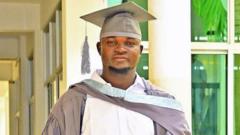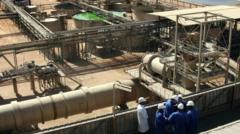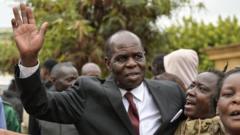President William Ruto of Kenya has announced plans to build a $9 million church at the presidential office, defending this move against criticism over its implications on the nation's secular principles and rising living costs. The project has raised eyebrows, particularly among secular groups and religious leaders concerned about favoritism towards Christianity.
Kenyan President Defends Controversial Church Construction at State House

Kenyan President Defends Controversial Church Construction at State House
William Ruto's $9m church project at Nairobi's presidential residence sparks widespread debate and criticism amid Kenya's secular constitution.
Kenyan President William Ruto has ignited a firestorm of controversy with his plans to construct a substantial church at the State House in Nairobi, a move he asserts he will personally finance. The ambitious project, which is estimated to cost around $9 million, aims to accommodate 8,000 worshippers and has already been met with significant backlash from various sectors of society.
In a defiant speech at State House, Ruto remarked, “I am not going to ask anyone for an apology for building a church. The devil might be angry and can do what he wants.” This provocative statement has struck a chord among a populace already disillusioned with his governance style, particularly regarding the intertwining of governmental functions and religious institutions.
Local media outlet Daily Nation has unveiled architectural plans for the church, provoking questions about its compliance with Kenya's secular constitution and appropriateness in light of the country’s economic challenges. Critics argue that at a time when many citizens are grappling with the rising cost of living, such expenditures are wholly out of touch. Ruto, however, remains steadfast, claiming that the church will be built with his personal funds, though this leads to queries about the legitimacy of constructing a large place of worship on public land.
The Atheists Society of Kenya has threatened legal action to halt the construction, labeling it as an affront to democratic principles and a move toward Christian nationalism. Harrison Mumia, the group’s leader, emphasized the inclusive nature of the country, stating, “We want to remind him that Kenya does not belong to Christians only.”
Ruto, known as Kenya’s first evangelical president and dubbed “Deputy Jesus” for his overt expressions of faith, has previously encountered friction with various religious factions. Though around 85% of Kenya's population identifies as Christian, there are also significant Muslim and other religious communities, raising concerns about equal representation in national religious spaces.
Catholic Archbishop Philip Anyolo has urged for clarity on the nature of the church to avoid the perception of favoritism towards a specific Christian denomination, pointing out that public institutions should be neutral in religious matters. He expressed caution, preferring that such structures were erected in non-public spaces unless the purpose was clearly defined as chaplaincy.
The ongoing debate reflects broader discussions in Kenya about the role of religion in governance and public life, spotlighting the challenges faced by Ruto as he navigates these contentious waters in his administration.



















